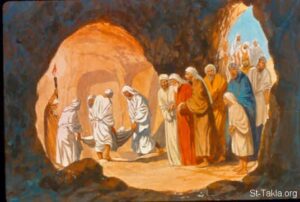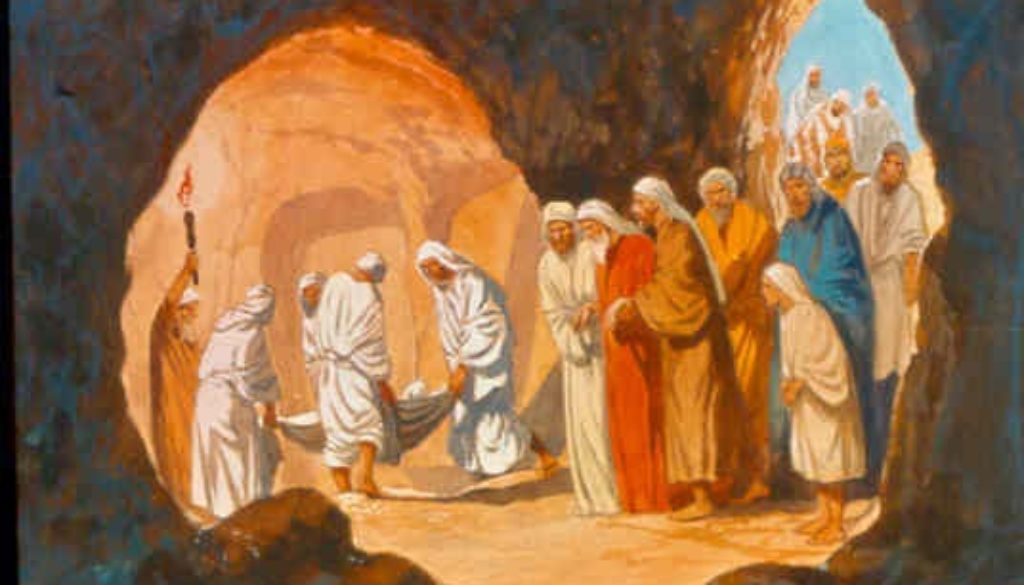Genesis 23:1-20 A Place for Sarah

Sarah has lived to see her son grow to be a man of 37 years old. But her time on earth has ended. Abraham wants a personal place to bury her.
Abraham and company have been “sojourning” in the land of Canaan for 62 years. This is my calculation from the time he left Harran and began his journey to wherever God would lead him. His time in Egypt during the famine is included in my calculation because we are not told how long he was there.
They have lived in tents and owned nothing but what could be transported with them from place to place. Abraham did have rights to draw water from wells he dug while living in the land but the land itself did not belong to him. This lack of a fixed physical address was not a hindrance to Abraham’s status among the people or to his prosperity.
But on this day, that was about to change. Abraham found himself in need of a permanent place for the body of Sarah to rest. She had faithfully accompanied Abraham on his travels and stood by him even when he didn’t stand by her. I’m referring to the two instances he passed her off as his sister to cover his own assets.
She wasn’t a perfect wife either. She was the one who hatched the idea of helping God out and when that went sideways, she insisted Abraham disinherit and expel his first son. She also laughed at the promise of God involving her, and lied about it. But Abraham loved her and God used her.
Now it was time to honor her with a permanent place. We will see later that this place will hold more than just her remains and it is the beginning of the “family crypt.” I’m curious why Abraham stated he wanted to “bury my dead out of my sight” (verse 4b). Was the custom of the land to not bury their people below the ground or in enclosed spaces? Did they keep the remains with them as is often done with ashes following cremation? Apparently the people of the land had “tombs” as they offered theirs to Abraham for his use. Or was Abraham asking for a place to bury Sarah’s body where it wouldn’t be moved but he was free to move about and leave the place of his grief? I don’t know if I will get an answer for that question either, this side of Heaven.
So let’s move on to the negotiations for a place for Sarah. All of the negotiations took place at the city gate. This was the customary place for such meetings and legal transactions. Nothing of legal standing or great consequence happened in private. Witnesses were required to establish the facts for all time. The more witnesses the better.
Abraham’s style of presenting his request is strange to me. It is not something I would expect to hear around a bargaining table. His initial request includes the word “give me property.” To me this brings to mind a request for a “gift” instead of a “purchase.” Apparently in this culture “gifts” came with “strings” attached. I tried researching this verbiage but I didn’t get very far.
As we move on with the negotiations though we see that Abraham is not asking for a gift of property but a gift of favor. He is MORE than willing to purchase a proper burial place and he already has one in mind. What he is asking for is that the current owner would part with it.
We have no idea the significance that piece of property held for its original owner nor why Abraham chose it from among all the land around him. Abraham’s request wasn’t even for the property; just the cave. But he became the new owner of both.
Ephron appears as willing to gift Abraham the property as any of the other men in attendance were willing to gift him their own tombs. But was he so willing because he was put on the spot in front of all the others or did he hold Abraham in the same high esteem as “a prince of God among us” (verse 6b)?
Abraham has apparently lived in this area long enough for the people to see his relationship with God. I don’t know the number of years there but his fame had spread. I wonder if it was the 90 year old woman and the 100 year old man having a child that spread faster or Abimelech’s dream from God. But word was out that Abraham was God’s man and should be given all due respect. This happens even among a people who did not worship the same God Abraham did. They recognized Abraham’s God’s superiority over even their own.
So in envision the negotiations sounding something like this, if they happened in our time.
♥ ♦ ♥
Abraham: “I recognize that I’m not from around here and that I am only passing through, but I need a place to honor my wife who has just died. I need a piece of property as a place to bury her.”
Hittite leaders: “We would be most honored to offer you ANY tomb you wish. You are the important man we have ever met and would consider it an honor to serve you in this way. You may choose from the best we have and no one will say a word to stop you.”
Abraham: “I appreciate your kind offer. But if you really want to help me, can you intercede on my behalf with the owner of this one particular cave? His name is Ephron and his father is Zohar. He owns a cave called Machpleah. I would like to purchase it from him at the full market value.”
Ephron: “Please take it and take the field with it too! I would be honored to give it to you as a gift so you can bury your dead.”
Abraham: “Thank you for your kindness but, please let me pay you for it. I don’t want to impose on your generosity. Name your price and I will meet it.”
Ephron: “That field is worth $400,000. That money means nothing to me compared to maintaining a good relationship and favor with you. Please just take it and bury your dead.”
Abraham takes out his purse and begins counting out money for Ephron. “Thank you for this kindness. I will not forget it. But I do insist on paying for it and in full.”
All those watching this exchange are even more impressed by Abraham’s character. He could have used his “clout” to get anything he wanted for free, no matter who it hurt. But instead he insisted on paying his own dealing fairly with the people.
♥ ♦ ♥
Did you notice that this piece of property is Abraham’s first investment in the land of promise? God told him that his descendants would one day own all the land but he chose to purchase what he needed instead of it being given to him.
This brings back to mind three other times that we are told of Abraham’s “financial” interactions with those he was living near or with. The first time and this time, Abraham refuses to become “rich” by another’s hand. The other time I’m referring to is when Abraham came back from rescuing the inhabitants of Sodom. The king of Sodom wanted to let Abraham keep all the spoils but release the people back to him. Abraham refused to accept even “a thread or a sandal strap” from the spoils. He wanted no part of Sodom’s goods or reputation. If he had accepted goods from Sodom he would have been profiting by the behavior of the people. He wanted NO part of their behavior to taint his camp! Is this why he insisted on purchasing the field here?
The two other times Abraham received wealth from another he didn’t turn it down. These two times were when he was given goods and money from Pharaoh and Abimelech with the return of Sarah. I would have expected him to pay reparations for his deceit but he got a blessing out of the deal instead. I have no explanation for why God allowed this to happen but one good thing did come from both experiences. Both rulers got to see the power of God in action and for His people. There was no doubt in their minds that Abraham’s God had brought trouble on them. They didn’t question His authority or preeminence over their own gods. They recognized the truth of His power and His relationship with His chosen people. Don’t mess with God’s kids!
Father God, thank You for sharing Your “scrapbook” with me again today. I’m not sure how to apply Abraham’s “negotiation techniques” to my life. I think the biggest thing I’m taking from today’s story is a reminder to use caution with what I join myself to financially. Abraham kept himself separate from those he lived near but not accepting their “gifts” into his life. He used what You had given him instead to “pay his way” in the land. He watched the character of what became part of his estate.
I have to be wise what I put my resources into. What I tie myself to will in one way or another define my character. If I give my money and time to schemes that hurt people, I will be just as responsible for their injuries as if I inflicted them myself. If I give my resources to organizations that help people, it will be as if I blessed them myself. I choose the latter!
Help me Holy Spirit to have discernment with where to put what You have blessed me with. Thank You that we were able to bless that family last week in a small way. I pray our gift spoke of You and Your love for them. Thank You for Steve’s heart to help and Your leading on what to say on their sign.



